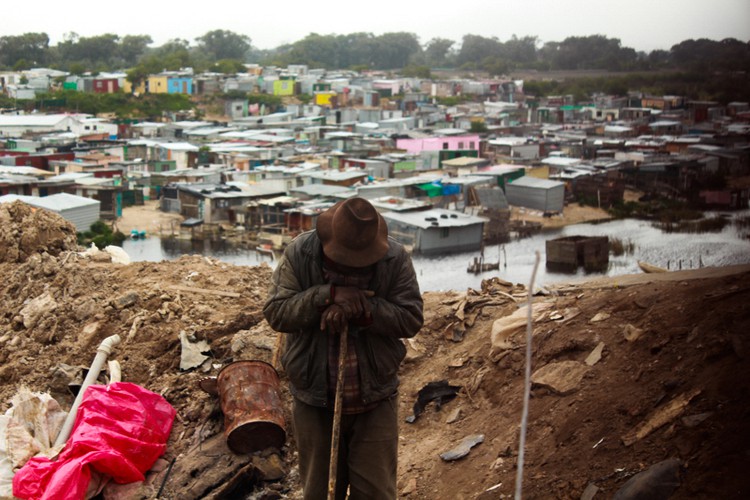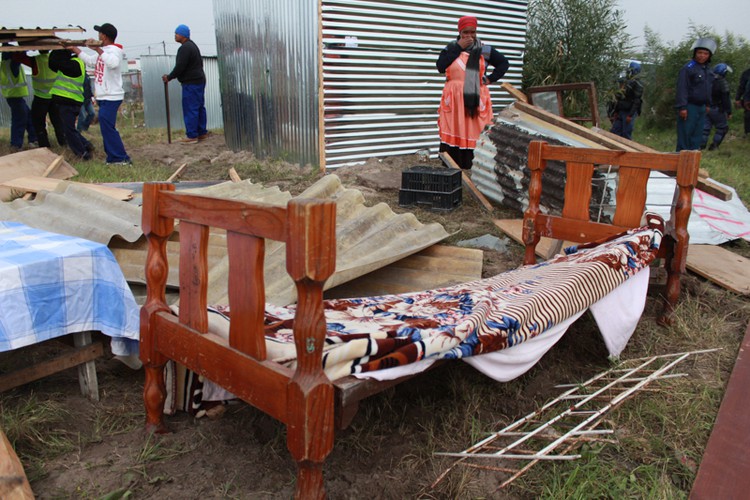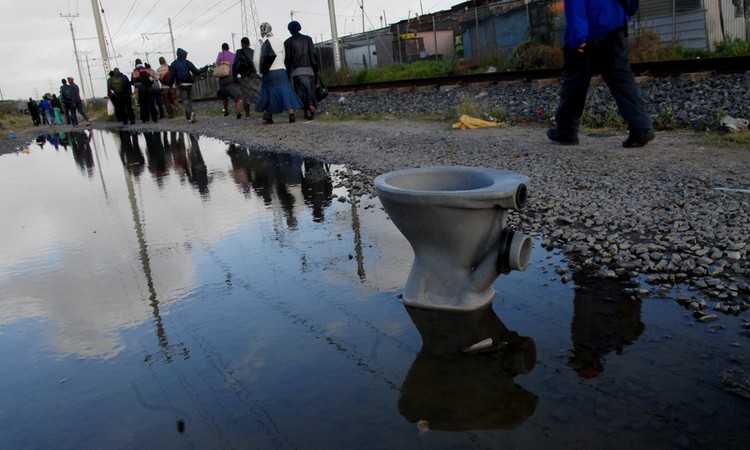
Masixole Feni’s collection of photos titled A Drain on Our Dignity is travelling across South Africa. All photos: Masixole Feni
22 September 2017
Masixole Feni, a son of the Cape soil and resident of Mfuleni, has just blessed us with a gift of seeing — ourselves, our city, our legacy — through a stunning book and exhibition, A Drain on our Dignity. This body of work was recently launched at the Centre for African Studies Gallery at the University of Cape Town as the outcome of Feni’s labours after he won the prestigious Ernest Cole Award for documentary photography in 2015. This exhibition should be compulsory viewing for all Capetonians because it holds up a mirror to the city, demanding reflection and questioning.
A Drain on our Dignity provides a visual slice through townships of Cape Town. It starts in Klipheuwel, close to Durbanville, and zigzags through Strand, Khayelitsha, Mfuleni, Delft, Freedom Farm, Siqalo, Marikana, Philippi, Masiphumelele, to alight in District Six with a homeless community. In this geographic sense, it peels back the daily travails of the majority of Capetonians and should therefore be of interest to everyone.
The documentary work reflected in the book and exhibition explores four routinised indignities and four plagues that dominate any prospect of security or comfort. The indignities include the absolute dehumanisation associated with unsafe, inadequate and poorly maintained sanitation in most township settings, especially Khayelitsha. It demands a question: how is it possible that in 2017, with our relative wealth as a city (the capital budget for 2017/18 is R6.8bn), we cannot once and for all eliminate the scourge of inadequate sanitation? Surely, all Capetonians will be willing to express solidarity and sacrifice to achieve this? The other indignities Feni brings into focus are the crisis of inadequate water supplies, along with a focus on unsafe electricity connections and the grinding fact of homelessness.
The documentary archive also exposes a number of plagues that wreak havoc on the plans and livelihoods of many township residents. The arbitrary cruelty and destructive power of both fires and flooding are only too well known; they stalk the city with stunning predictability. The enduring crisis and protests by members of the Imizamo Yethu community is but one reminder. However, as Feni’s work illustrates, it is not just fires and flooding but also pollution and forced evictions that accompany life in an informal settlement. One of Feni’s images depicts a broken bed sagging in front of a makeshift home as the residents are evicted. It speaks volumes. It is a reminder of the intimacies that get exposed and trampled upon as livelihoods get destroyed during the course of keeping the city compliant with unrealistic and inappropriate standards.

The sheer injustice of multiple indignities and living under the shadow of arbitrary and unpredictable shocks are powerfully evoked by Feni through a number of visual observations that are simultaneously stark, elegiac and prescient. For example, in one image a disembodied toilet bowl stands forlorn in a puddle of water left by the rains. In another image, two sanitation workers are reclined in the back of a pickup truck. Both workers seem a million miles away in their thoughts and in that instant also reflective of our shared humanity—going about our lives, fated to be intertwined and simultaneously always in our own worlds.
A Drain on our Dignity comprises a profound series of images of these self-same workers that maintain and clean portable communal toilets. The camera follows them from the townships to the depot where the collected waste is aggregated, the bowls are cleaned and the workers have to transition from their protective gear into civilian clothes. There is something profoundly humbling and insightful about gaining this shard of insight into a routine aspect of what makes this city tick, something that is hard to articulate but is strongly conveyed through the exhibition.
Feni brings an original eye and first-hand perspective to the rich tradition of documentary photography in South Africa. He has clearly found his voice and that voice offers an instructive perspective as we try to figure out what living together in difference and inequality adds up to. Who knows, we may even be able to collectively devise and divine ways to not drain the dignity of our citizens but rather to restore and celebrate them instead.

The book A Drain on Our Dignity is published by Jacana Media.
A Drain on Our Dignity will show at the:
For more information please contact - Paul Weinberg, co-ordinator, Ernest Cole Award. Paul.Weinberg@uct.ac.za 021 650 5251
See also: http://www.ernestcoleaward.uct.ac.za
Feni often publishes photo essays on GroundUp.